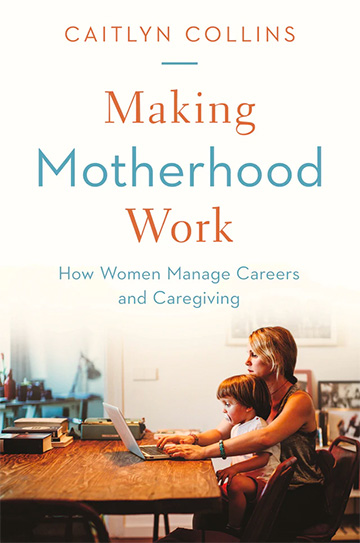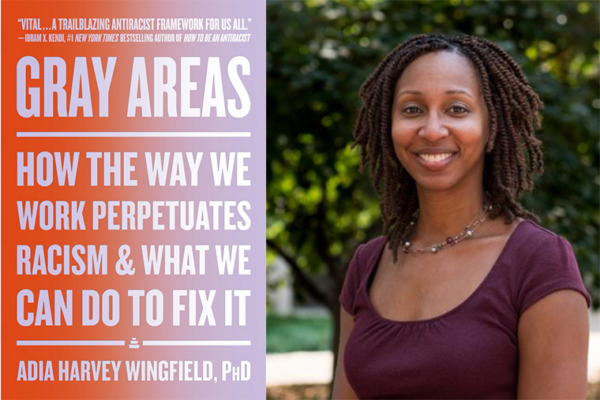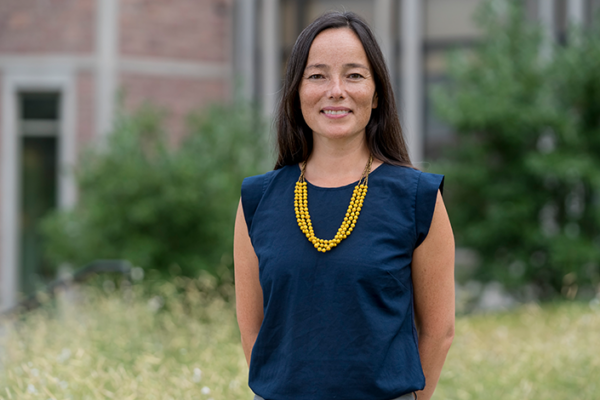Growing up, Caitlyn Collins, an associate professor of sociology in Arts & Sciences at Washington University in St. Louis, witnessed firsthand the challenges working mothers face as they juggle demanding jobs and family needs. Her own mother walked away from a successful and meaningful career and accepted a job with less pay and prestige so she would have more time at home to raise her two daughters.
“My mom would tell you it was the best decision she ever made, but as a young adult looking back, it felt really unfair to me that she felt she had no choice but to forgo her career in order to be the kind of mom she wanted to be because her workplace was so inflexible and unreasonable in its expectations,” Collins said.
“I remember thinking: There has got to be a better way. That’s what spurred my interest in women’s rights and gender inequality, specifically in the workplace and family life.”

Making Motherhood Work
How Women Manage Careers and Caregiving
Over the last decade, Collins has talked with hundreds of mothers around the world about their experiences. Those conversations were the basis of her 2019 bestselling book, “Making Motherhood Work: How Women Manage Careers and Caregiving.” Her scholarship has shined a light on the struggles U.S. families face due to the lack of affordable child care options and other social supports, such as paid family leave, that are commonplace in other Western industrialized countries.
Collins was an expert on working moms but, until recently, she wasn’t one. That all changed in the summer of 2022 when Collins gave birth to her daughter, Eleanor. Today, Collins is juggling the demands and joys of raising a toddler while teaching and researching the child care market in St. Louis.
“From my early conversations with St. Louis parents from a wide variety of backgrounds, it’s clear that parents here struggle in the same ways they do across the U.S. because we have no national child care system,” Collins said.
“I was interested in this topic of child care because it was abundantly clear from my first book that the one policy solution that would help the most families the most is child care. We need a high-quality, universal, affordable national system, which is the norm in other Western industrialized countries. We are light-years behind our peer nations, and I see this as a national embarrassment. And so, I feel both a personal and a professional imperative to do a project that tries to help move the needle on the national child care front.”
How has your research shaped your perspective as a new parent?
In “Making Motherhood Work,” I wrote about the crushing sense of guilt many moms in the U.S. expressed. They never felt they were doing enough at work or at home, and they felt inadequate as a result in both spheres. The moms I talked to often broke down in tears describing the fact that they were giving it their all, yet still felt that they were falling short. It was so obvious, though, that they were doing an amazing job and that their children were surely doing well given this abundant love and effort they were bringing to their roles as mothers.
That made it easier for me to not have those feelings of self-doubt. I don’t feel guilty at all. I think I’m doing an awesome job. I feel confident that my daughter is thriving in her lovely day care and with my partner and me at home. Feeling unburdened from that guilt is one of the biggest gifts my professional background has given me in this role as a mother.
How have you found balance as a working mother?
Working parents feeling stressed and overwhelmed is not their fault — our system is set up to make you feel those ways. My job as an academic is one where I’m rewarded for working harder and longer and being more productive. But I’m not a robot, and caring for myself as a whole person, and my family, is actually good for my job.
So for me, I set aside ample time each day to focus on my daughter. From the time I pick her up from day care until she goes to sleep, I try not look at emails, I do not return phone calls, I’m not available for meetings. And that uninterrupted time brings me tremendous joy. When she goes to sleep, I sometimes work again, or eke out time for myself. Having this flexibility is one of the enormous blessings of being an academic. Knowing that she’s thriving at her day care also enables me to focus on my work without feeling worried about her when I’m here.
Again, many parents don’t have this ability. I think we need to move away from a discourse of “work-family balance” to one of “work-family justice,” where all of us have the opportunity and power to participate fully in paid work and family care.
You’ve said that universal child care is the one policy solution that would help U.S. families the most. How do you respond to those who say it cannot be done?
What are your priorities? The money is there. It’s just that we’re allocating it poorly, currently. With even the tiniest sliver of our defense budget, we could fund everything I’m talking about. The U.S. spends roughly three times more annually as a percent of GDP on its military than it does on public supports to families. It’s not that we are too poor a nation to provide paid family leave or universal child care. It’s that we are a nation unwilling to dedicate our money to these efforts.
How can we shift public perception about these types of policy solutions for families?
Parents in the U.S. who can afford to send their kids to a good day care often talk about being privileged or feeling lucky. It’s an implicit way of acknowledging how unequal things are. We need to stop using that rhetoric, though, and instead shift to thinking about universal child care and other supports for families as rights.
Swedish moms don’t see it as a privilege to send their kid to a place where they’re healthy and safe. In Sweden, every single child has the right to go to a fabulous high-quality day care where all the teachers have at least a bachelor’s degree in early childhood education. But in the U.S., many parents don’t make enough money to send their kids to a quality day care facility. The average cost for infant day care exceeds the cost of in-state college tuition in 33 states. So, many have to worry about their children’s literal safety while they work. Who in the world can do a good job at work when you’re worried about whether their children are physically safe, let alone being nurtured and developed in the ways that we know matter so much to young children? We hear stories of children dying in day care centers. This has happened in St. Louis. But this is a national crisis — it’s appalling.
One of my big motivations for writing my first book was highlighting how abnormal it is that we lack these supports that are normative everywhere else. We have a right to spend time with a newborn after they’re born. We have the right to paid vacation days and sick days to rest and recuperate and come back to our work feeling fulfilled and re-energized. We have the right to send our child to a healthy, safe, affordable day care in which they can thrive, not just survive. Those are rights. And talking about it in that way, I think, will really help shape the conversation and hopefully move the needle on the policy front, too.



